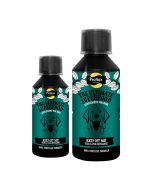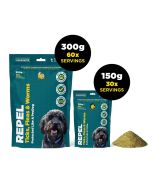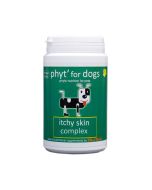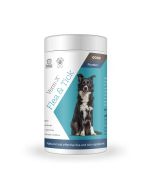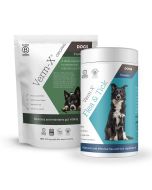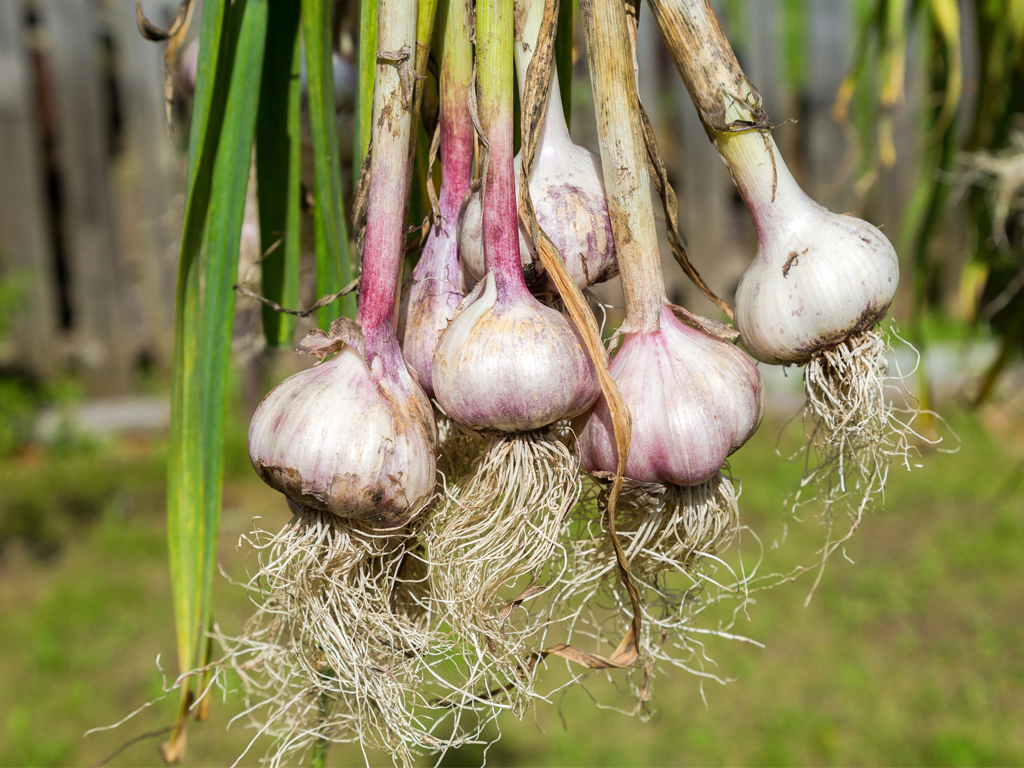
A quick internet search for ‘can my dog eat garlic?’ can send you down a rabbit hole of conflicting information. There seems to be a general consensus that garlic is toxic to dogs and shouldn’t be consumed under any circumstances. But is that really the case?
Garlic, or Allium sativum, is a vegetable that has been used to both flavour food and cure ailments (human and animal) across various cultures for centuries. As part of the Allium family, garlic is related to onions, chives leeks and shallots – this is where much of the confusion regarding its toxicity stems from. Garlic is high in inulin, amino acids, sulphur, zinc, potassium and phosphorus. It also contains vitamins A, C and B-complex, calcium, magnesium, manganese, selenium and germanium. Perhaps most importantly, garlic also contains bioactive Allicin and Ajoene.
Without getting too deep into the science behind it all, alliin (a noted sulfoxide) combines with alliinase (an enzyme) when garlic is chopped, crushed, minced or chewed. This produces allicin, which is the therapeutic component of garlic.
Benefits of garlic for dogs:
- Antibiotic, antifungal and anthelmintic – garlic supports good intestinal hygiene when included as part of a dog’s regular diet
- Supports a healthy immune system
- Aids lymphatic drainage
- Decreases cholesterol build-up (anti-cholestrolemic) to support cardiovascular health, aids in regulating blood pressure
- Antioxidant rich – chelates (reduces) heavy metals such as lead, cadmium, methylmercury and phenylmercury
Garlic is also commonly used to repel fleas and ticks, as the scent that comes from including garlic in your dog’s diet builds up in the natural oils on their skin and coat. This smell helps keep your dog flea and parasite free without the need for harsh chemical insecticides.
View our range of products containing garlic for dogs, cats and other pets, including everything from topical sprays to powdered supplements. Some customer favourites include:
ProDog Repel - Flea, Tick and Worm Repellent Supplement for Dogs - Protect your dog from ticks, fleas, worms and mites with this highly effective, all-in-one parasite prevention supplement, with an all-natural vet approved formula
Dorwest Garlic and Fenugreek Tablets for Dogs - One of Dorwest's best sellers for 60 years, and a fundamental ‘staple’ product in the Dorwest range. Dorwest have recently given these a makeover so they are now better than ever, with a change from garlic oil to black aged garlic extract, which brings a whole host of additional benefits while minimising the chance of side effects.
Proflax Keep Off Me! Tincture - This Proflax product has been vet formulated to naturally and effectively repel unwanted visitors, minimising the need for chemical treatments.
Phytopet Garlic & Echinacea - Phytopet's combination of herbs traditionally used for all types of infections and to help support immune system function, containing garlic, echinacea, golden seal, myrrh and Pau D'arco.
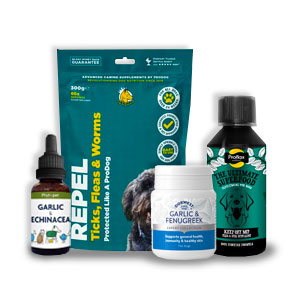
Is Garlic Safe for Dogs?
Garlic supplements are safe for adult dogs, and can aid with repelling fleas and ticks, supporting intestinal hygiene, and helps support a healthy immune system boosting cardiovascular health and regulating blood pressure. Garlic is not suitable for puppies under 6 months, as they do not product enough red blood cells in their body yet to process it.
Is Garlic Bad for Dogs?
Garlic is not toxic to dogs in food or regular doses. The study which claims garlic is toxic - Lee et al., 2000 - used hugely inflated doses of garlic (5kg per day) to determine their findings. A subsequent study, using lower doses over a longer period found that “long-term oral administration of aged garlic extract at 90mg/kg/day for 12 weeks did not show any adverse effects in dogs”.
If your dog already suffers from IBS or IBD, garlic may not be a good choice as it contains fructans (oligofructose) which can upset digestive systems. Breeds such as Akitas and Shiba Inus are genetically predisposed to be sensitive to garlic. This is due to their sensitivity to the haemolytic effects of oxidants such and N-propyl disulphide, also known as Heinz Body Anaemia.
If you suspect that your dog may be garlic sensitive, or have any concerns about breed related risks, you may want to consult your holistic vet.
So where does the confusion come from?
Most research studies on the safety of garlic for canine consumption base their findings on the effects of garlic extracts, in hugely inflated doses and with unnatural delivery methods. The use of fresh garlic is tricky in research, as you can’t account for variances between individual plants. The study that cemented garlic’s reputation as toxic and to-be-avoided-at-all-costs was a 2000 study by Lee et al, where dogs were fed 5g of garlic per kilo per day. For context, a 75lb/34kg golden retriever would be fed 60 cloves of garlic daily at this rate – that’s 4 full heads of garlic! A subsequent study, where garlic was fed at a lower rate over a significantly longer period, observed that “long-term oral administration of aged garlic extract at 90mg/kg/day for 12 weeks did not show any adverse effects in dogs”. Not only were no adverse effects observed, but the addition of garlic also upregulated the gene expressions of canine Nrf2 and Nrf2-regulated phase II antioxidant enzymes, which is an anti-inflammatory pathway.
Garlic does contain fructans (oligofructose to be precise), which can upset sensitive digestive systems. If your dog already suffers from leaky gut, IBD or IBS, garlic may not be the best choice of supplement. When undigested fructans ferment in the small intestine, they can cause bloating, gas and constipation, so it’s best to feed garlic only when your dog’s digestive system is already happy and healthy!
Garlic contains thiosulfates, as do other vegetables in the Allium family such as the onion, leeks, chives and shallots that we mentioned earlier. Breeds such as Akitas and Shiba Inus are genetically predisposed to be sensitive to garlic. This is due to their sensitivity to the haemolytic effects of oxidants such and N-propyl disulphide, also known as Heinz Body Anaemia. If you suspect that your dog may be garlic sensitive, or have any concerns regarding breed related risks, you may want to consult your holistic vet.
Symptoms of Heinz Body Anemia include:
- Diarrhea
- Dark urine
- Decreased appetite
- Jaundice
- Lethargy
- Pale gums
- Rapid heart beat
- Laboured breathing
Garlic is not suitable for puppies under 6 months, as they do not produce enough red blood cells to process it. Garlic does also impact blood clotting, so don’t feed for approximately two weeks before scheduled surgery. It is also advised that pregnant or lactating dogs should avoid garlic.
Conclusion
In summary, when used properly, garlic is a fantastic herb that offers numerous benefits. If your dog is a good candidate for garlic it can provide plenty of benefits when fed at the correct rate. If you’re worried about safely using garlic, don’t worry; there are many other herbs that offer a whole host of benefits!
